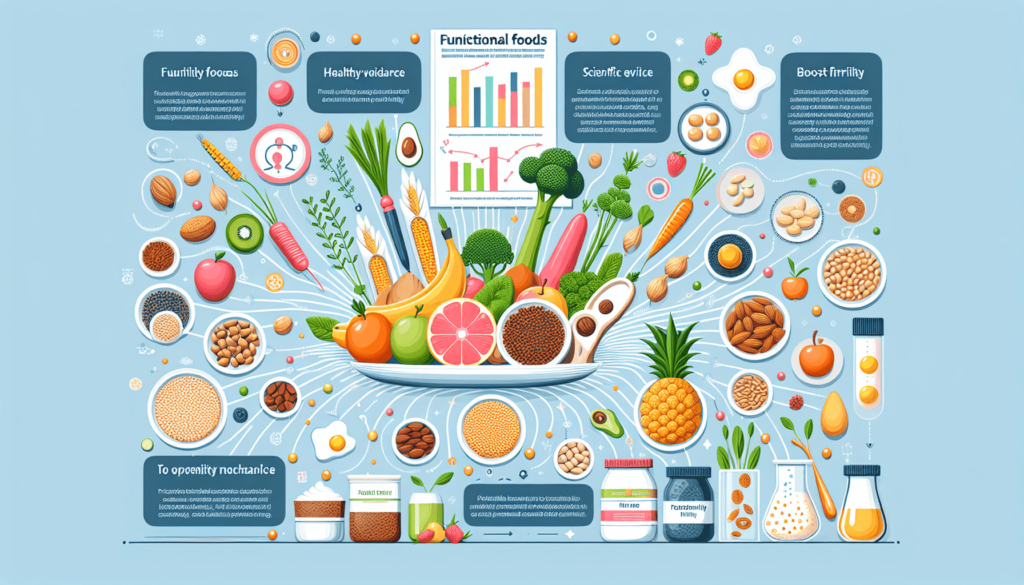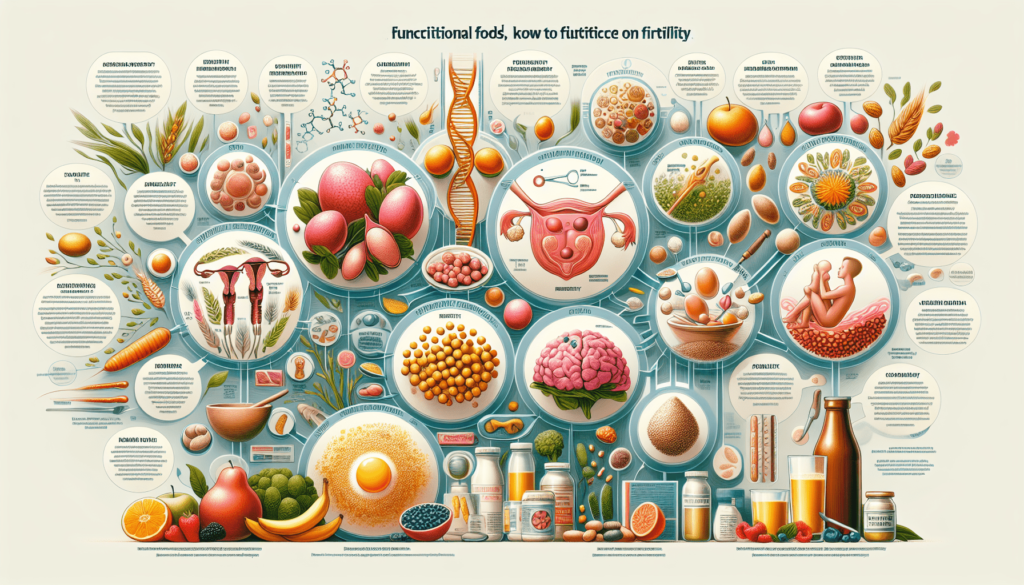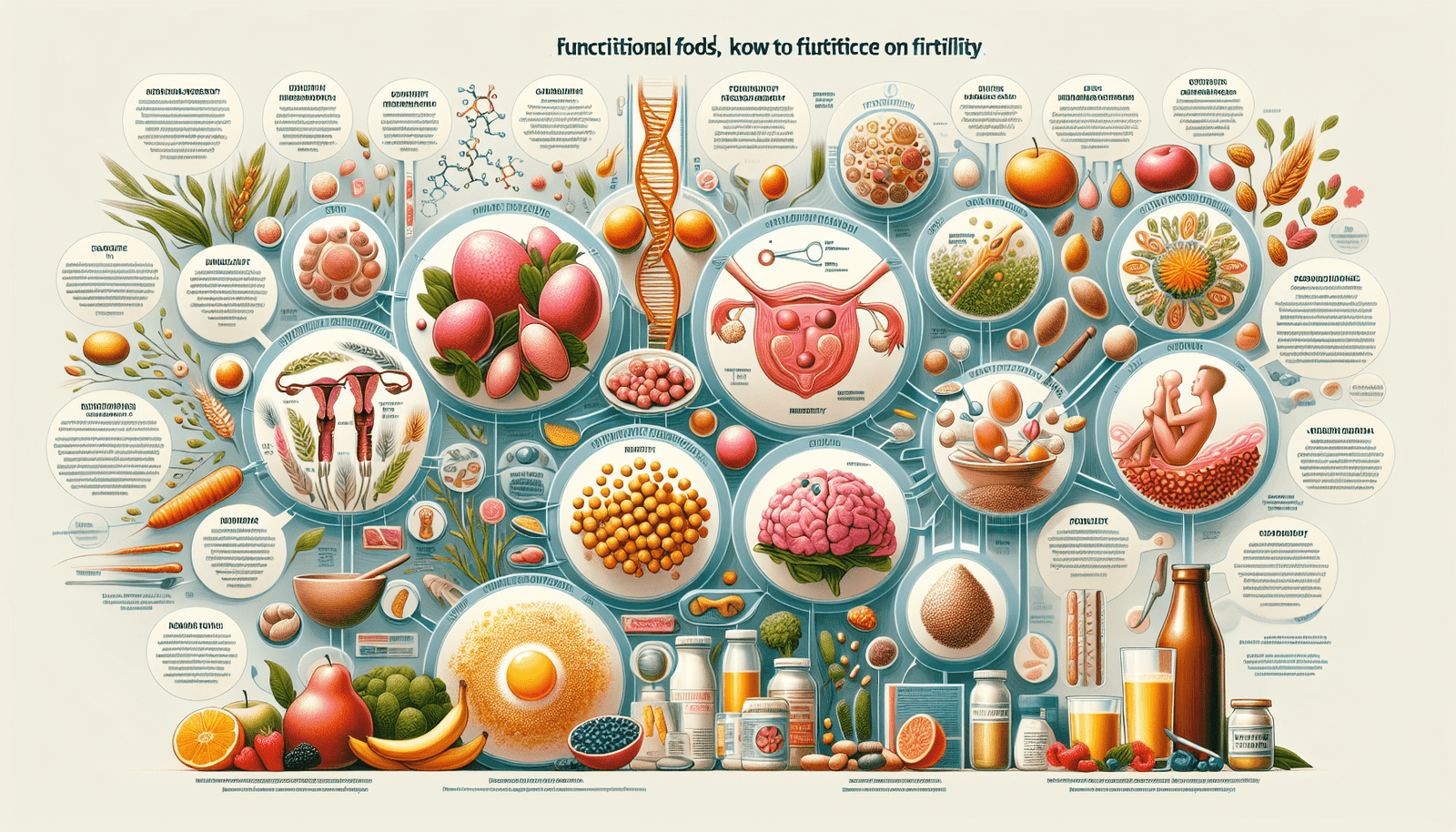Did you know that the food you eat might have an impact on your fertility? It’s true! Functional foods, which are specially formulated to provide additional health benefits beyond basic nutrition, are gaining popularity in the quest for fertility enhancement. These foods are packed with specific nutrients and bioactive compounds that are believed to support reproductive health and improve the chances of conception. In this article, we will explore the potential benefits of functional foods in enhancing fertility and uncover some of the top options to consider. So, if you’re hoping to boost your chances of starting a family, keep reading to learn more about the power of functional foods.
Understanding Fertility
Fertility refers to the ability of an individual to conceive a child. It is the natural ability to reproduce and is a common desire for many individuals and couples. Understanding fertility is important for those who are trying to conceive or are concerned about their reproductive health.
Definition of Fertility
Fertility is defined as the natural capability of an individual to conceive a child and achieve a successful pregnancy. It is influenced by various factors, including age, overall health, genetics, and lifestyle choices. Both men and women have a role in fertility, as it requires healthy sperm and eggs to initiate the process of conception.
Factors Affecting Fertility
There are several factors that can affect fertility in both men and women. In women, age is a crucial factor, as fertility declines with age due to a decrease in the number and quality of eggs. Other factors that can impact fertility in women include hormonal imbalances, polycystic ovary syndrome (PCOS), and underlying medical conditions such as endometriosis.
In men, factors such as sperm count, motility, and morphology can affect fertility. Lifestyle habits, such as smoking, excessive alcohol consumption, and drug use, can also have a negative impact on fertility for both men and women.
The Role of Nutrition in Fertility
Nutrition plays a significant role in reproductive health and fertility. A balanced diet rich in essential nutrients can help support reproductive functions and improve the chances of conception. Poor nutrition, on the other hand, can lead to hormonal imbalances, irregular menstrual cycles, and decreased sperm quality.

Impact of Diet on Fertility
Research suggests that certain dietary patterns can have a positive impact on fertility. A diet rich in fruits, vegetables, whole grains, lean proteins, and healthy fats is associated with improved fertility outcomes. On the other hand, a diet high in processed foods, refined sugars, and unhealthy fats may have a negative effect on fertility.
Important Nutrients for Reproductive Health
Several nutrients are essential for reproductive health and fertility. Folate and folic acid are crucial for preventing neural tube defects in developing fetuses. Iron is important for maintaining healthy blood and oxygen transport, which is necessary for reproductive function. Omega-3 fatty acids have been shown to improve hormone production and regulate menstrual cycles. Vitamin D is important for both male and female reproductive health, while zinc is essential for sperm production and sperm health.
What are Functional Foods?
Functional foods are foods that provide additional health benefits beyond their basic nutritional value. These foods contain bioactive compounds that have a positive impact on specific physiological functions in the body. They can promote overall health and contribute to specific health goals, including fertility enhancement.
Definition of Functional Foods
Functional foods are defined as whole foods or fortified foods that have specific health benefits beyond basic nutrition. They are typically rich in essential nutrients and bioactive compounds that support various bodily functions. Functional foods can be found in various forms, including fruits, vegetables, whole grains, lean proteins, and dairy products.

Benefits of Functional Foods
Functional foods offer numerous benefits for overall health and well-being. They can help reduce the risk of chronic diseases, boost immunity, and support optimal health. In the context of fertility, functional foods can provide the necessary nutrients and antioxidants that support reproductive health and improve the chances of conception.
Functional Foods for Enhancing Fertility
Certain functional foods have been found to have specific benefits for fertility enhancement. These foods are packed with important nutrients and antioxidants that support reproductive health and hormonal balance.
Specific Functional Foods for Fertility
Quinoa, a nutrient-dense grain, is a great choice for enhancing fertility. It is rich in essential amino acids, vitamins, and minerals that support reproductive functions. Berries, such as blueberries, strawberries, and raspberries, are high in antioxidants that protect reproductive cells from damage. Fatty fish, like salmon and sardines, are excellent sources of omega-3 fatty acids, which promote hormone balance and improve sperm health. Leafy greens, such as spinach and kale, are packed with folate, iron, and other essential nutrients for reproductive health. Beans and lentils provide a good source of plant-based protein and fiber, which can help regulate blood sugar levels and support hormonal balance. Nuts and seeds, such as almonds, walnuts, and flaxseeds, are rich in omega-3 fatty acids, vitamin E, and zinc, which are all beneficial for reproductive health.
Role of Antioxidants in Fertility
Antioxidants play a crucial role in fertility enhancement. They help protect reproductive cells from oxidative damage, improve sperm quality, and regulate hormonal balance. Functional foods like berries, leafy greens, and nuts provide a rich source of antioxidants that can support fertility.
Fertility-Boosting Nutrients in Functional Foods
Several key nutrients found in functional foods are known to enhance fertility and reproductive health.
Folate and Folic Acid
Folate, a B-vitamin, and its synthetic form, folic acid, are essential for promoting fertility and preventing birth defects. These nutrients play a crucial role in DNA synthesis and cell division, which are critical during the early stages of pregnancy.
Iron
Iron is important for maintaining healthy blood and oxygen transport in the body. Inadequate iron levels can lead to anemia, which may affect fertility. Consuming iron-rich foods like leafy greens, lean meats, and fortified cereals can help support reproductive health.
Omega-3 Fatty Acids
Omega-3 fatty acids are essential for regulating hormone production and reducing inflammation in the body. They have been associated with improved sperm quality and female fertility. Fatty fish, flaxseeds, and chia seeds are excellent sources of omega-3 fatty acids.
Vitamin D
Vitamin D is important for both male and female reproductive health. It is involved in hormone regulation and plays a role in sperm production and egg quality. Foods fortified with vitamin D, such as dairy products and certain cereals, can be beneficial for fertility.
Zinc
Zinc is a key nutrient for male reproductive health. It is necessary for sperm production and contributes to sperm motility and quality. Oysters, lean meats, beans, and nuts are all good sources of zinc.
Fertility Superfoods
Certain foods are often referred to as “fertility superfoods” due to their high nutritional value and potential positive effects on fertility.
Quinoa
Quinoa is a gluten-free grain that is rich in protein, fiber, and essential amino acids. It provides a wide range of vitamins and minerals that support reproductive health.
Berries
Berries, such as blueberries, strawberries, and raspberries, are high in antioxidants that protect reproductive cells from oxidative damage. They also provide important vitamins and minerals for overall health.
Fatty Fish
Fatty fish, like salmon and sardines, are excellent sources of omega-3 fatty acids. These healthy fats promote hormone balance and improve sperm health.
Leafy Greens
Leafy greens, such as spinach, kale, and broccoli, are packed with essential nutrients like folate, iron, and vitamin C. They support reproductive health and provide antioxidants that protect against oxidative stress.
Beans and Lentils
Beans and lentils are rich in plant-based protein and fiber, which can help regulate blood sugar levels and hormone balance. They also provide important nutrients like iron and zinc.
Nuts and Seeds
Nuts and seeds, such as almonds, walnuts, and flaxseeds, contain essential fatty acids, vitamin E, and zinc. These nutrients are beneficial for reproductive health and can help balance hormones.
Impact of Lifestyle Habits
In addition to nutrition, lifestyle habits can also have a significant impact on fertility.
Alcohol and Caffeine Consumption
Excessive alcohol consumption and caffeine intake have been linked to decreased fertility in both men and women. It is recommended to limit alcohol intake and moderate caffeine consumption when trying to conceive.
Smoking and Fertility
Smoking can have detrimental effects on both male and female fertility. It can disrupt hormone levels, damage reproductive cells, and decrease the chances of successful conception. Quitting smoking is highly recommended for those trying to conceive.
Exercise and Fertility
Regular exercise is important for overall health and can support fertility. However, excessive exercise or intense physical activity can disrupt hormone balance and affect menstrual regularity. Finding a balance and engaging in moderate exercise is recommended for those trying to conceive.
The Importance of a Balanced Diet
Maintaining a balanced diet is crucial for overall health and fertility. It involves consuming a variety of nutrient-rich foods in appropriate proportions to meet the body’s needs.
Adequate Caloric Intake
Ensuring an adequate caloric intake is important for reproductive health. Extreme calorie restrictions or excessive weight loss can disrupt hormone levels and negatively impact fertility. It is important to maintain a balanced calorie intake that supports overall health.
The Role of Macronutrients
Macronutrients, including carbohydrates, proteins, and fats, are essential for optimal fertility. Carbohydrates provide energy, proteins support reproductive tissue growth and repair, and healthy fats contribute to hormone production. Balancing these macronutrients is important for reproductive health.
Importance of Hydration
Staying hydrated is essential for overall health and fertility. Drinking an adequate amount of water helps maintain proper bodily functions and supports reproductive health. It is recommended to drink at least 8 cups of water per day.
Other Factors to Consider
In addition to nutrition and lifestyle habits, there are other factors to consider when aiming to enhance fertility.
Maintaining a Healthy Weight
Maintaining a healthy weight is important for fertility. Both excessive weight and underweight can have negative effects on reproductive health. It is recommended to achieve and maintain a healthy weight through a balanced diet and regular exercise.
Stress Management
Stress can have a significant impact on fertility. High levels of stress can disrupt hormone levels and interfere with the reproductive process. Engaging in stress-reducing activities, such as meditation, yoga, or counseling, can be beneficial for fertility.
Medical Conditions and Fertility
Certain medical conditions, such as polycystic ovary syndrome (PCOS) and endometriosis, can affect fertility. It is important to work with a healthcare professional to manage these conditions and optimize reproductive health.
Final Thoughts
When it comes to enhancing fertility, it is important to take a holistic approach. Consulting a healthcare professional who specializes in reproductive health is recommended to address any concerns and receive personalized guidance. Incorporating functional foods into a balanced and nutritious meal plan, along with maintaining a healthy lifestyle and managing stress, can significantly enhance fertility outcomes. Remember, fertility is a complex and individualized process, and it is important to be patient and persistent in the pursuit of conception.
